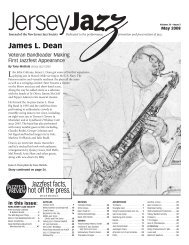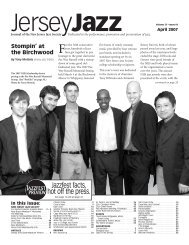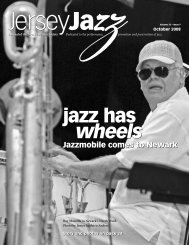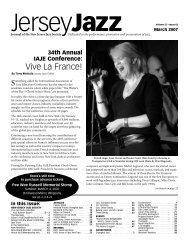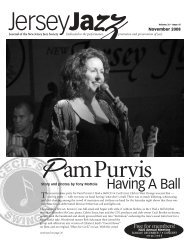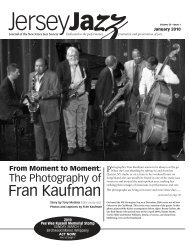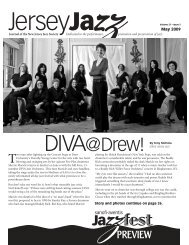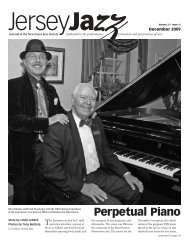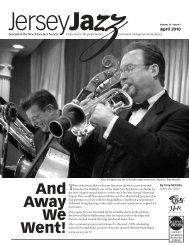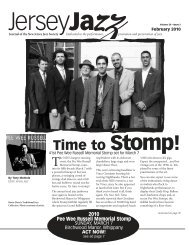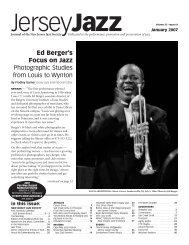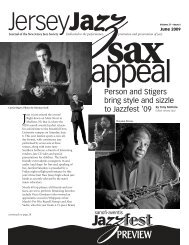REMEMBERING - New Jersey Jazz Society
REMEMBERING - New Jersey Jazz Society
REMEMBERING - New Jersey Jazz Society
You also want an ePaper? Increase the reach of your titles
YUMPU automatically turns print PDFs into web optimized ePapers that Google loves.
<strong>Jersey</strong>Articles<strong>Jazz</strong>MORE ABOUT LEScontinued from page 16only did it once when I worked oppositehim with Jerry Vivino and thoroughlyenjoyed the experience. However when Iwas a kid I would play Les Paul and MaryFord records on the juke box over and over,notably “Via Con Dios.” It was thrillingwhen I finally met him.Vic Juris: I met Les Paul when I was 17years old. I had just gotten my driver’slicense and I drove up to his studio for myvery first recording session. It was with agroup of singers. His studio, in those days,was open to the public. I met him at thatsession and had a lifelong friendship withhim. He treated me great and was veryencouraging. He really liked what I did. Heloved to play. He used to come to some ofmy gigs and sit in and play and hang out. Iended up spending a lot of time with himat his house. He was just a very interestingperson to be around. I think inventing waswhat he enjoyed the most. He loved musicand he loved the guitar and to be aroundpeople, but he was a naturally curiousperson. He could have lain back on hislaurels and taken it easy but he kept tryingto find new pickups for the guitar andthings of that nature.He was a friend of mine, I really loved Les.Paul Nowinski played bass for Les at one ofhis last gigs at Fat Tuesdays and the firstfour years at the original Iridium —The first time I heard of Les Paul, I didn’tknow it was a person, I thought it was justa guitar. I was familiar with him, but I onlymet Les when he was 80. I [went to FatTuesdays] and saw his show and it was,“That guy is cool.” I spent almost five yearswith him and we remained friends. He wasmy adopted grandfather and the beginningof my old-timer musical experience. I rememberthat first night I played with him,he basically made that whole show aboutme. “Yeah, you know, he doesn’t know anyof the songs, but he’s not bad, is he?” Youhad to have a sense of humor to stick withLes because if you didn’t, he didn’t want tobe around you. Those years for me werelike college…Show Business College. Ididn’t like going to school, but I was reallytrying to learn that stuff and he had a lot tooffer. He was a complete original, seriouslyfrom the old school. I loved him, I reallydid.He had a catalogue of jokes that he wouldjust hit every week. It was like fishing. He’dthrow them out there and get a laugh andthen he’d just stick on it and elaborate untilhe had everybody rolling. He would get theaudience and just kill them. It was funny,after years of being off and going back andhearing all the same jokes and I was: “Les,I’ve got to tell you, when I was playing withyou I didn’t think those jokes were thatfunny”; but he actually got me to crack up,just the way he told it. He would always riffon his material. Part of his show was teasingthe band and Tony Bennett was thereonce and Les gave me a little bit extra-hardtime that night. I got off stage and I sawTony and he said, “Les Paul — ShowBusiness 101.”He’d let anybody get up on stage. That wasthe big part of the show. If somebody wasreally bad, he’d go, “Want to do anotherone?” If they knew nothing, he would makethem play by themselves. And if they weregood he’d keep them up there all night.There were times that Les wasn’t aware ofwho even was there. One night Carole Kayecame in. She played bass on all the BeachBoys records. She’s a tremendous L.A. sessionbass player. She and Joe Pass werereally tight. She proceeded to get on stageand she was like Joe Pass on guitar. He said,“OK, you start it up” and because Les didn’tknow who she was, she had no mercy andshe just wiped the floor with him.[Usually] people would come in and playso much all over the place. Then Les wouldplay the melody with one finger and justbring the house down. They would play amillion notes, and nobody felt anything,but when Les just played the melody thatwas so deep that it would affect people. Hewas upset that he couldn’t do the fast stuffand felt limited by his arthritis and everything,but it didn’t matter. He would figureout a different way to do it. That was one ofthe biggest lessons that I learned from him;play the melody. All he had to do is play themelody and the place would go crazy, allthe time.He was so tenacious, just sticking to whathe wanted to do. He had a tremendousmental focus on the matter at hand, whateverit was. It was like a tunnel vision and Ithink that is why he got so much done.He was one of the first tricksters to get thatelectric sound. Charlie Christian was anelectric guitar player, but [his] guitar stillsounded acoustic. When Les got his soundit was like from another world. All thethings with the echoes and reverbs, he wasthe first to get into that so the rockerslatched on to that. He was a show businessentertainer on that guitar and he would dothose tricks and Jeff Beck copped it andJimmy Page copped it and then all the otherguys. He’s had generations of influence.Everybody is taking it hard, we’ve seen himget sick and come back so many times thatit just seemed like, OK, he’s just resting. Hehad a lot of wiry strength. His mind wasjust completely there, but when you’re thatold…everybody was sure he was going tomake it to at least 100. We all wanted himto but all we have is his memory, hisformula. We can all learn from that.Bucky Pizzarelli: Les Paul got a sound onone note that nobody else could get a —great, great sound. Les’s mind was alwaysone step ahead of everybody else. I rememberwhen I played with him at the St. Regis;I told him that Ed McMahon was comingin, because I was doing the Tonight Show.He got a table [set up] right next to us witha glass and a bottle of Budweiser beer becauseEd used to do the ads for Budweiser.It was brilliant because when Ed saw it hebroke up.Lou Pallo was the ever-present guitar playeron Les’s bandstand—I met him like 45 years ago and the firstthing he said was here’s my phone number,give me a call. I spent a lot of time withhim. We did a lot of jamming together. Hefollowed me all around in <strong>New</strong> <strong>Jersey</strong> becausehe was retired at that time. No matterwhere I played, he’d show up. He’d bringhis guitar, plug into my amp and just playwith me. What a thrill [and] honor just tohave him there, because when I was a kid, Iidolized Les Paul. Then he said let’s getsomething going, we’ll do some concertsand maybe we’ll get a gig in <strong>New</strong> York,which we did. But we did a couple in <strong>New</strong><strong>Jersey</strong> in what he called a box. When you goto a restaurant they always have a partyroom. It’s just a room, there isn’t any bar,the ambiance is not the same and he didn’tlike that. He wanted a nice nightclub wherethere is a stage and a bar. He liked to beclose to people. He always said, “Lou, don’tget big. Don’t go to the big time, becausewhen you play for 10,000, 20,000 peopleyou’re not close to them and it is so nice tobe near them.” He liked that nice nightclubintimacy. So we booked Fat Tuesdays andwe were there for 12 years and then theIridium for about 13 years or whatever itwas.He had arthritis very bad. When he was sittingin with me all the time, he had problemswith his fingers. He had to learn toplay all over again [because] he was onlyusing two or three fingers. He’d come incontinued on page 2018_________________________________ October 2009



